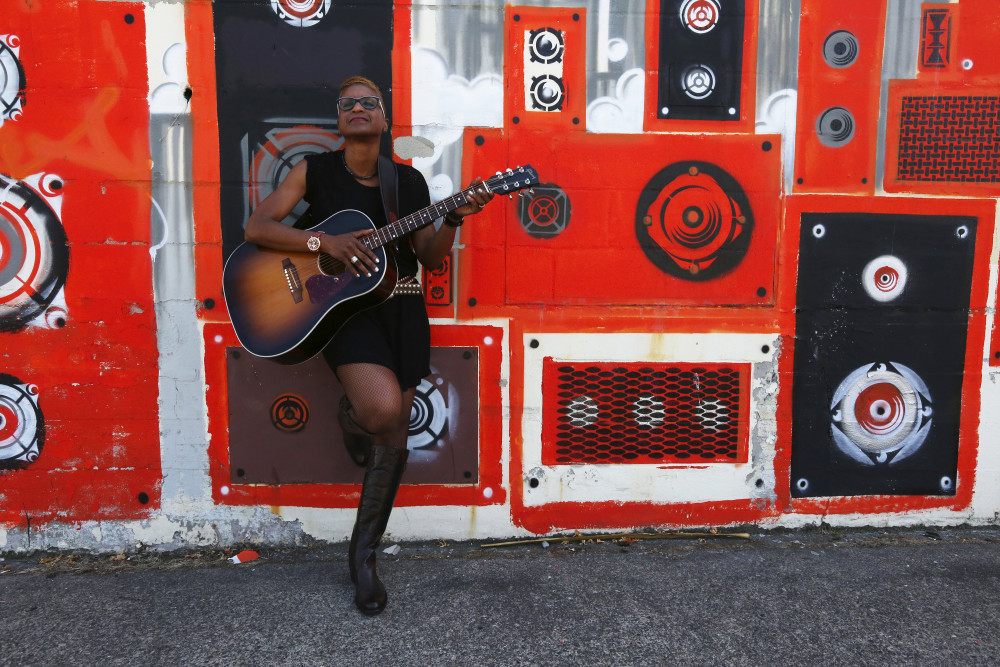By Nicole Brodeur
The Seattle Times.
SEATTLE
In 2005, Paula Boggs’ sister-in-law, Julie, was killed in a car accident.
In her grief, Boggs picked up her guitar. It was like being reunited with an old friend. That feeling spurred her to successfully audition for a songwriting-certificate program at the University of Washington.
“Music was nowhere in my life,” Boggs said recently. “I had left it behind.”
She loved being part of a community of songwriters who ranged from teenagers to people in their 60s. And at the end of the year, the teacher pulled her aside: “What a shame if you didn’t keep going.”
It gave Boggs pause: “I thought, ‘What does that look like, to keep going?'”
Now, after decades after leaving her guitar for Army experience, law school and corporate life, including a stint as general counsel at Starbucks, Boggs has found her way it back to the musical kid she was, and released “Carnival of Miracles,” her second album of songs with the Paula Boggs Band. (www.paulaboggsband.net)
“I’m called to it, I love to do it,” Boggs, 56, said of playing music. “I have to write songs.”
She has no shortage of things upon which to draw.
The oldest of four kids, Boggs grew up in Virginia, where her mother, a teacher, made her take piano, which she dropped, then clarinet, which she lasted six months.
Inspired by the nuns who taught her (and who played Peter, Paul and Mary on their guitars), Boggs got her mother to rent her a guitar. It stuck, and she later bought her own in a pawnshop.
When she was 13, Boggs’ parents divorced, and she and her siblings moved to Europe with their mother, who was an educator in the Department of Defense system.
She returned to the U.S. to attend Johns Hopkins University, and she spent a summer in Army Airborne School as an Army ROTC cadet, even though she was afraid of heights.
She entered law school at the University of California, Berkeley, then worked at the Pentagon and the White House. A mentor suggested she apply to be an assistant U.S. attorney, which brought her to Seattle, a place she had visited during law school and yearned to see again.
“It was love at first sight,” she said. “Mount Rainier stunned me.”
Once here, she joined a Catholic church and played some guitar in the folk Mass. She also met a woman named Randee Fox, who would become her partner. Not long after, Boggs left the church.
“And I left music, too,” Boggs said. “I let it go. And every once in a while, Randee would say, ‘How come you don’t play anymore?’
“My response was, ‘That was then, this is now.'”
She took a job at Dell in Texas, and in 2002 returned to Seattle to work as a general counsel at Starbucks, reporting directly to CEO Howard Schultz.
Then her sister-in-law died. She and Fox have since become legal guardians of Boggs’ niece, Jada. (The girl’s father, Boggs’ brother, Dallas, remains active in her life.)
Boggs left Starbucks in 2012, feeling like she had accomplished her goals there.
“I love Starbucks,” she said. “But from this point forward, it’s incremental.”
Later that year, Boggs joined the Obama re-election campaign as a “surrogate”, one of about 500 people who went to events on behalf of the president.
All of which makes you wonder if Boggs’ band is a vanity project, bought and paid for by the spoils of her corporate success.
She was, after all, able to book studio time at the Bear Creek and London Bridge studios, hire producer Trina Shoemaker, who has worked with Brandi Carlile and Sheryl Crow; and sign backing musicians like former Santana drummer Michael Shrieve and bassist Andy Stoller, who played with Tracy Chapman.
That’s true, Boggs said, but she prefers to see this as an investment in herself; in the “encore” period of a life spent meeting expectations, her own and others’.
It’s her turn, now, and a time she senses a lot of people facing, wondering about, and struggling with.
“There are a million boomers like me who are in an encore season, who aspire to be something they always put aside for later,” she said. “What retirement is, how it plays out, is very different for boomers.”
Her style pulls from all corners: jazz, rock, soul and blues.
“I call it ‘soulgrass,'” she said, moving back and forth in her chair.
And her songs pull from five decades of life experiences: love, death, social justice.
A song named “Look Straight Ahead,” (which she mixed with Seattle rapper J. Pinder) was written from the perspective of a young, African-American urban male.
She wrote the song before the shooting deaths of Trayvon Martin and Michael Brown _ but it tells a similar story of a kid walking alone, trying to avoid getting into trouble.
When Pinder first read the lyrics, he told Boggs: “Your hero could have been me.”
Another song, “Edith’s Coming Home,” has to do with Alzheimer’s disease and dementia.
Boggs is on the board of the School of Rock in Seattle, and co-chair of the capital-campaign governance board at public radio station KEXP in Seattle, which is building a new home at Seattle Center.
In between, she is writing and performing with her band. It’s a rush, it’s leadership, it’s some kind of church. Everything Paula Boggs’ life has been about.
“Performing is an amazing communion between a performer and an audience,” she said. “It doesn’t matter if it’s an audience of one or an audience of 1,000. It’s still the same show.
“It’s special to me.”














































































































































































































































































































































































